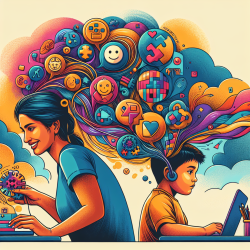Understanding Children's Eco-Anxiety: A Data-Driven Approach
In recent years, the topic of climate change has permeated public discourse, sparking a range of emotional responses across various age groups. However, the impact of climate change on children's mental health, particularly in the form of eco-anxiety, remains underexplored. A recent study titled How children make sense of climate change: A descriptive qualitative study of eco-anxiety in parent-child dyads sheds light on this critical issue, providing valuable insights for practitioners working with children.
Key Findings from the Study
The study utilized a descriptive qualitative design to explore the experiences of children aged 8-12 years and their parents. Through semi-structured interviews and surveys, researchers identified three main themes:
- Children's Understanding of Climate Change: While children generally understood climate change as a result of human pollution, their knowledge was often fragmented, with misconceptions about its causes and effects.
- Emotional Reactions: Children expressed a range of emotions, including sadness, anger, and fear, often feeling overwhelmed by the enormity of the issue.
- Coping Mechanisms: Children employed various strategies to cope with their emotions, including problem-focused actions, emotion-focused avoidance, and, less frequently, meaning-focused coping.
The Role of Parents
The study also highlighted the significant role parents play in shaping their children's responses to climate change. Parents who were aware of their children's concerns tended to have children who used more adaptive coping mechanisms. This suggests that open communication and emotional support from parents can mitigate the negative impacts of eco-anxiety.
Implications for Practitioners
For practitioners working with children, these findings underscore the importance of addressing eco-anxiety in therapeutic settings. Here are some strategies to consider:
- Promote Emotional Literacy: Encourage children to express their feelings about climate change and validate their emotions.
- Facilitate Open Discussions: Create safe spaces for children to discuss their concerns and learn about climate change in an age-appropriate manner.
- Encourage Meaning-Focused Coping: Help children find positive reframing strategies that acknowledge the complexity of climate change while fostering hope and empowerment.
Encouraging Further Research
While this study provides valuable insights, it also highlights the need for further research into the emotional experiences of children in the context of climate change. Practitioners are encouraged to explore this area further, contributing to a more comprehensive understanding of eco-anxiety and its implications for children's mental health.
To read the original research paper, please follow this link: How children make sense of climate change: A descriptive qualitative study of eco-anxiety in parent-child dyads.










